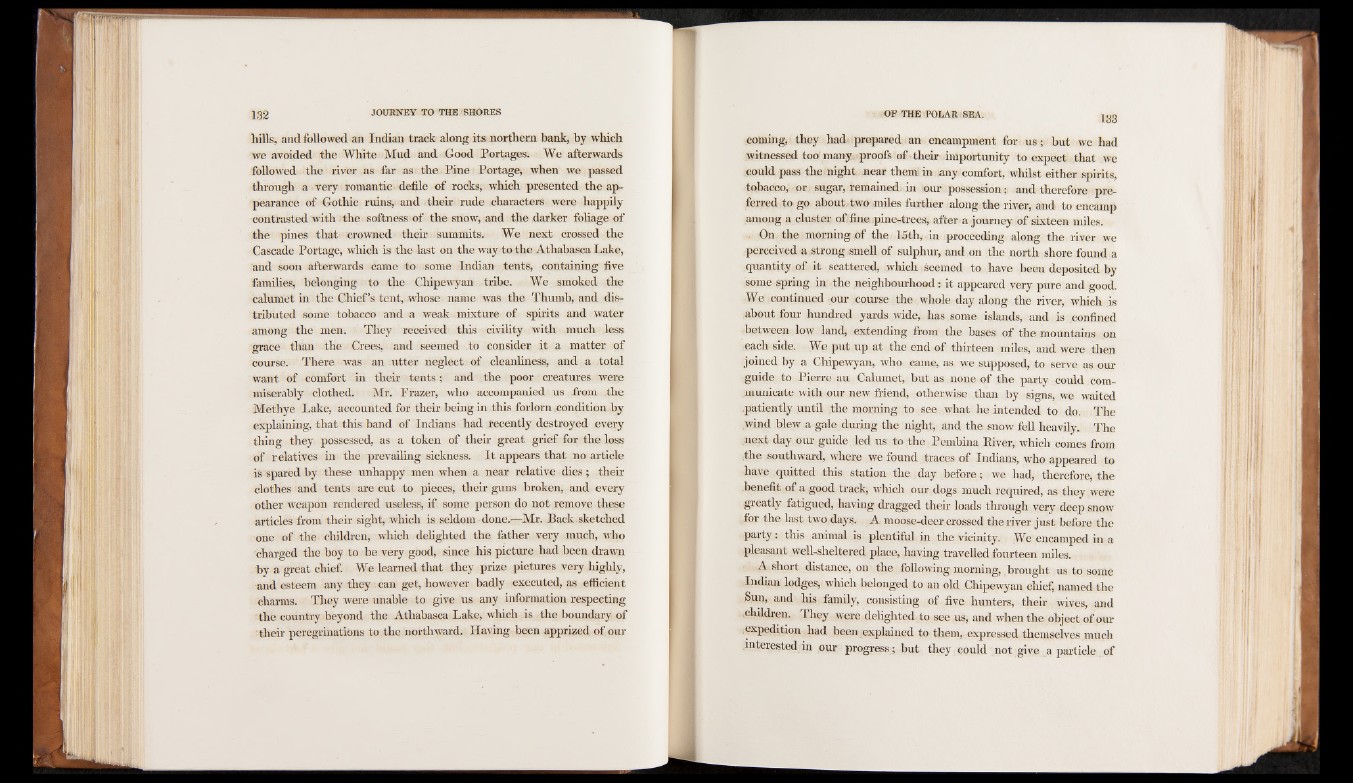
hills, and followed an Indian track along its northern bank, by which
we avoided the White Mud and Good Portages. We afterwards
followed the river as far as the Pine Portage, when we passed
through a very romantic defile of rocks, which presented the appearance
of Gothic ruins, and their rude characters were happily
contrasted with the softness of the snow, and the darker foliage of
the pines that crowned their summits. We next crossed the
Cascade Portage, which is the last on the way to the Athabasca Lake,
and soon afterwards came to some Indian tents, containing five
families, belonging to the Chipewyan tribe. We smoked the
calumet in the Chief’s tent, whose name was the Thumb, and distributed
some tobacco and a weak mixture of spirits and water
among the men. They received this civility with much less
grace than the Crees, and seemed .to consider it a matter of
course. There was an utter neglect of cleanliness, and a total
want of comfort in their tents; and the poor creatures were
miserably clothed. Mr. Frazer, who accompanied us from the
Methye Lake, accounted for their being in this forlorn condition by
explaining, that this band of Indians had recently destroyed every
thing they possessed, as a token of their great grief for the loss
of relatives in the prevailing sickness. It appears that no article
is spared by these unhappy men when a near relative dies; their
clothes and tents are cut to pieces, their guns broken, and every
other weapon rendered useless, if some person do not remove these
articles from their sight, which is seldom done^-Mr. Back sketched
one of the children, which delighted the father very much, who
charged the boy to be very good, since his picture had been drawn
by a great chief. We learned that they prize pictures very highly,
and esteem any they can get, however badly executed, as efficient
charms. They were unable to give us any information respecting
the country beyond the Athabasca Lake, which is the boundary of
their peregrinations to the northward. Having been apprized of our
coming, they had prepared an encampment for us; but we had
witnessed too many-proofs of their importunity to expect that we
could pass the night near them in any comfort, whilst either spirits,
tobacco, or , sugar, remained, in ®ur possession ; and therefore preferred
to go about tw o,miles further along the river, and to encamp
among a cluster of fine pine-trees, after a journey of sixteen miles.
. On the morning ,of the loth, in proceeding along the river we
perceived a strong smell of sulphur, and on the north shore found a
quantity of it scattered, which deemed to have been deposited by
some spring in the neighbourhood: it appeared very pure and good.
We continued our course the whole day along the river, which is
about four hundred yards wide, has some islands, and is confined
between low land, extending from the bases of the mountains on
each side. We put up at the end of thirteen miles, and were then
joined by a Chipewyan, who came, as we supposed, to serve as our
guide to Pierre au Calumet, but as none of the party could communicate
with our new friend, otherwise than by signs, we waited
patiently until the morning to see what he intended to do. The
wind blew a gale during the night, and the snow fell heavily. The
next day our guide led us to the Pembina River, which comes from
the southward, where we found traces of Indians, who appeared to
have quitted this station the day before; we had, therefore, the
benefit of a good track, which our dogs much required, as they were
greatly fatigued, having dragged their loads through very deep snow
for the last two days. A moose-deer crossed the river just before the
party: this animal is plentiful in the vicinity. We encamped in a
pleasant well-sheltered place, having travelled fourteen miles.
A short distance, on the following morning, .brought us to some
Indian lodges, which belonged to an old Chipewyan chief, named the
Sun, and his family, consisting of five hunters, their wives, and
.children. They were delighted to see us, and when the object of our
.expedition had been explained to them, expressed themselves.much
.interested in our progress; but they could not give a particle of